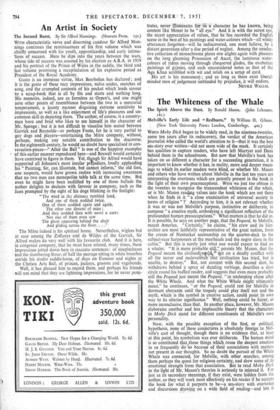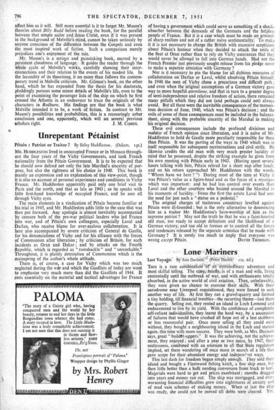The Whiteness of the Whale
WHEN Moby Dick began to be widely read, in the nineteen-twenties, some ten years after its rediscovery, the verdict of the American journalist who called the world's attention to it—that it was the best sea-story ever written—did not seem wide of the mark. It certainly has qualities to capture readers, who have left Marryat and Dana behind them in the schoolroom. But now that Melville's book has taken on so different a character for a succeeding generation, it is important to know whether it has, in reality, more and deeper mean- ings to which its earlier readers were blind, or whether Mr. Mason and others who have written about Melville in the last ten years are interpreting the overtones which are patently present in the book in the light of their own preconceptions. Were we just too obtuse in the twenties to recognise the transcendent whiteness of the whale, or is Mr. Mason reading values into the book which are not there when he finds in it "a close examination of universal society in terms of religion " ACcording to him, it is not relevant whether it was or was not Melville's purpose, instinctive or deliberate, to compose "a creative myth, embodying a significant reflection of the profoundest hurnan preoccupations." What matters is that he did so. It is possible, he says on another page, that the Pequod, to Melville, meant America. "Certainly," he claims, "his crew and its hier- archies are most faithfully representative of the great nation, from the cream of Nantucket seamanship on the quarter-deck to the subject-race harpooners at the mastheads and the negro slave in the • cabin." But this is surely just what one would expect to find on a whaler. "It is more probable, stijj,',". persists Mr. Mason, that the Pequod means the civilisedtwirlde` it on a deadly conflict with • all the terror and malevolenCe that civilisation has tried, but is unable, to destroy." But, not content with this second shot, he withdraws behind -a spray of dazzling verbiage, describes a slow circle round his baffled reader, and suggests that even more probably still the Pequod just meant the Pequod, "in -unsleeping chase after the White Whale. And what the White Whale might ultimately mean," he continues, ." or the Pequod, could rest for Melville in dormant abeyande until the tragedy could play itself out and the • myth, which is the symbol in creative action, could point its own way to its ulterior significance." Well, nothing could be fairer, or more inconclusive, than that. In another place, however, Mr. Mason ' elaborates another and less implausible theory that the characters ; in Moby Dick stand for different constituents of Melville's own personality. - Now, with the possible exception of the first, or political, • hypothesis, none of these conjectures is absolutely foreign to Mel- ville's cast of thought, though there is no evidence that, at least • at this point, his symbolism was ever deliberate. The human mind 'is so constituted -that .those things which.rouse the deepest emotion ; in us frequently do lo because of their associations with matters not present in our thoughts. So no doubt the pursuit of the White , Whale was connected, for Melville, with other searches, among ;them perhaps the quest for religious certainty, and drew some of its emotional strength from that association. But to read Moby Dick -in the light of Mr. Mason's theories is seribusly to misread it. For just as its secondary theanings, if they exist, were hidden from the *author, so they will work most effectively on his reader if he accepts the book for what it purports to be—a sea-story with overtones and discursions drawing on a wide field of reading—and lets it affect him as it will. Still more essential is it to forget Mr. Mason's theories about Billy Budd before reading the book, for the parallel between that simple sailor and Jesus Christ, eVen if it was present in the background of Melville's mind, cannot be taken seriously by anyone conscious of the difference between the Gospels and even the most inspired work of fiction. Such a comparison merely prejudices one's enjoyment of the tale.
Mr. Mason's is a serious and painstaking book, marred by a persistent cloudiness of language. It guides the reader through the whole cycle of Melville's works, carefully showing their inter- connections and their relation- to 'the events of his modest life. In the fecundity of its theorising, it no more than follows the contem- porary trend in Melville criticism. Mr. Gilman's book, on the other hand, which he has expanded from the thesis for his doctorate, ploddingly pursues some minor details of Melville's life, even to the point of examining the passenger lists of the ship on which he first crossed the Atlantic in an endeavour to trace the originals of the characters in Redburn. His findings are that the book is what Melville intended it to be, a work of fiction. In contrast to Mr. Mason's possibilities and probabilities, this is a reassuringly sober conclusion and one, apparently, which will set several previous



















































 Previous page
Previous page